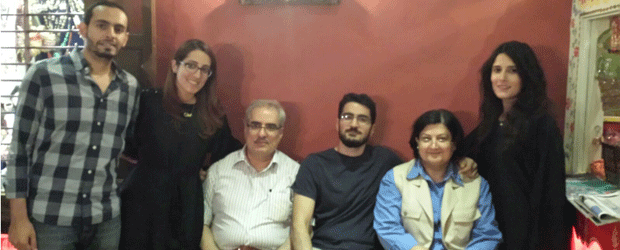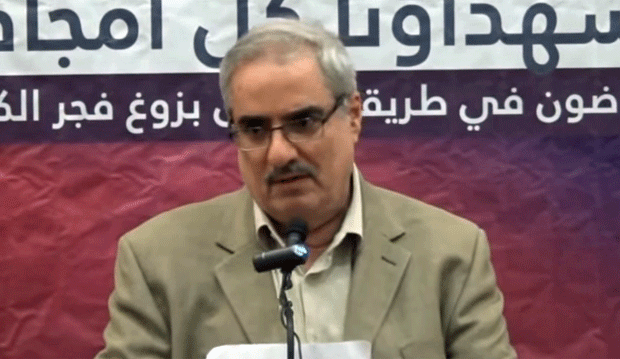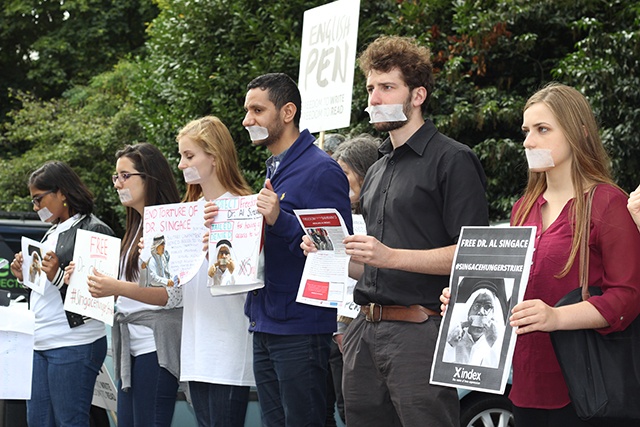13 Apr 2017 | Bahrain, Bahrain News, Middle East and North Africa
[vc_row][vc_column][vc_column_text]

Ebrahim Sharif, third from left, Farida Ghulam, second from left, and family.
Farida Ghulam, the wife of Ebrahim Sharif, the former secretary-general of Bahraini opposition group National Democratic Action Society (Wa’ad), has written an open letter to political and human rights institutions worldwide calling for solidarity against the dissolution of Wa’ad.
Written on behalf of the secular political party, Ghulam’s letter asks for national figures, Arab organisations and international institutions to help “protect the little remaining freedoms enjoyed by Bahrainis that have been undermined over the past few years”.
On 6 March 2017, the Ministry of Justice filed a lawsuit calling for the dissolution of Wa’ad following a statement made by the political societies of the National Democratic Movement, a secular group of which Wa’ad is a part, demanding a “comprehensive national consensus to end the political and constitutional crisis” in Bahrain.
The Ministry of Justice, the body administratively responsible for political organisations in Bahrain, has accused Wa’ad of “advocating violence” and supporting an “environment that incubates terrorism”, arguing that statements made by the political societies represented a departure from established principles.
The first hearing of the case against Wa’ad took place on the 20 March 2017 and the final hearing is scheduled for the 17 April 2017, with a judgment expected to be passed within one month.
The time of the comments made by the National Democratic Movement marks six years since the end of the pro-democracy movement in Bahrain, which saw numerous protests take place in opposition to the repressive government.
The authorities’ retaliation to the peaceful demonstrations of its citizens resulted in the injury of more than 30 protesters. Recent years have seen an increase in government repression, arrests — with many tried in military courts — and revocation of citizenship for hundreds of Bahrainis.
The US State Department has recorded the continued violation of human rights in the Arab nation and the Bahraini authorities’ preferred use of security measures over the pursuit of diplomatic solutions obtained through a negotiated political settlement. The political climate in Bahrain has led to increased hardships for the country’s citizens, amplified by an economic crisis.
Wa’ad, the first established secular party opposition in Bahrain, questions the legitimacy of the current Bahraini constitution. It upholds the principles of democracy, equality and freedom of thought and belief. Despite its failure to win any seats in the 2006 parliamentary elections, Wa’ad, led by Sharif between 2005 and 2012, has retained a high media profile.
Ghulam’s letter indicates that the Ministry of Justice has purposely failed to refer to key documents, statements and positions taken by Wa’ad and other opposition groups in building its case, including the Manama Document issued in October 2011 and the Declaration of Principles of Nonviolence presented in November 2012. This confirms Wa’ad’s commitment to “peaceful means, rejection of violence and adoption of dialogue and consensus building to find solutions in political differences”.
Ghulam also says that the authorities have taken and interpreted words from Wa’ad statements “at will and out of context”.
Actions taken by the Bahraini authorities to dissolve Wa’ad follow their crackdown on opposition parties since the mass protests of 2011, with two other opposition groups dissolved as a result of similar lawsuits. Islamic Action Association (Amal) was brought to an end in 2012 and its secretary-general, Sheikh Mohammed Ali Almahfood, was given a five-year prison sentence. 2016 saw the dissolution of the nation’s largest political organisation, Al-Wefaq National Islamic Society. Secretary-general Sheikh Ali Salman was sentenced to nine years in prison. The citizenship of the group’s spiritual leader, Sheikh Isa Qasim, was also revoked.
In addition to actions taken against Wa’ad, new charges were also brought against Sharif earlier this month following a series of tweets. The political activist was charged with “incitement to hatred against the regime” under article 165 of Bahrain’s penal code following messages posted on his Twitter account.
The former Wa’ad leader was imprisoned and tortured in 2011 for his role in campaigning against Bahrain’s political regime alongside a group of other human rights advocates known as the Bahrain 13. He was rearrested in 2015 a few weeks after his initial release, following a speech where he called for sustained peaceful opposition against the country’s authorities.
Sharif also faced charges in November 2016 after comments he made to the Associated Press regarding Prince Charles’ visit to Bahrain, although these were later dropped. He now faces a further three years in prison.
[/vc_column_text][/vc_column][/vc_row][vc_row][vc_column][vc_basic_grid post_type=”post” max_items=”4″ element_width=”6″ grid_id=”vc_gid:1492096403121-1bd99655-9b6e-3″ taxonomies=”716″][/vc_column][/vc_row]
22 Mar 2017 | Bahrain, Bahrain Statements, Campaigns, Campaigns -- Featured
Bahrain’s decision to file charges against Ebrahim Sharif underscores the country’s tactical use of judicial harassment to suppress freedom of speech.
Ebrahim Sharif, the former secretary-general of the secular opposition group National Democratic Action Society (Wa’ad), was charged with “inciting racial hatred against the regime” under article 165 of Bahrain’s penal code. The alleged offenses stem from tweets Sharif posted.
“As we have seen in Bahrain’s treatment of human rights activist Nabeel Rajab, the charges against Ebrahim Sharif target freedom of expression in an attempt to stifle even the mildest criticism,” Melody Patry, head of advocacy, Index on Censorship said.
In the charges the public prosecution office quoted one of Sharif’s tweets: “The ministry of justice threatens to dissolve the remaining opposition societies because they ‘lost the fundamentals of political activity.’ What remains of the decor of the democratic state?”
The prosecution alleges that the use of the word “decor” implies that there is no democracy in Bahrain, a crime according to them.
The prosecution is also citing three other Twitter conversations: an exchange in which Sharif reminded the Tunisian interior minister, who had demanded respect for Bahraini sovereignty, that Tunisia’s ousted president Ben Ali had expressed the same sentiment to repress the opposition during the Arab spring; a series of tweets about protester Abdulla Alzjooz, who Sharif referred to as a “martyr”; and a retweet of an Amnesty International poster commemorating the 6th anniversary of the arrests of leaders of the 14th February movement, with which Sharif included a message of respect.
The Bahrain Institute of Rights and Democracy reported that it is currently unclear whether the case will be transferred to the courts, or if the government has imposed a travel ban on the political leader, who was previously imprisoned from 2011 to 2015, and then again from 2015 to 2016 on similar charges stemming from his involvement in the pro-democracy movement and speeches he delivered. He could now face up to three more years in prison.
The charges against Sharif came on the same day a Bahraini court heard opened dissolution proceedings against Wa’ad. he Bahraini government is accusing Wa’ad of inciting violence and filed for the group’s dissolution earlier in March, though it provided no evidence of its allegations. Wa’ad’s lawyers requested time to respond to the charges, and the next court date is set for 17 April 2017.
15 Nov 2016 | Bahrain, Bahrain Statements, Campaigns, Campaigns -- Featured, Statements
[vc_row][vc_column][vc_column_text]
Bahrain’s public prosecution on Sunday 13 November charged leading opposition politician Ebrahim Sharif under article 165 of the penal code with “inciting hatred against the regime,” after he spoke to the Associated Press last week. We, the undersigned, consider this to be a violation of his right to freedom of expression and a reprisal against his political activity.
The charge carries a three-year sentence and comes after Prince Charles’ controversial visit to the Gulf monarchy last week. It is the latest development in the Bahraini government’s intensified crackdown on civil society in the past year.
Speaking on Prince Charles’ arrival in the country Sharif, the former leader of the secular National Democratic Action Society (Wa’ad), told AP he was afraid the visit would “whitewash” human rights abuses.
Sharif told AP: “I don’t see what’s gone on behind closed doors or whether the prince raised any questions of human rights. Bahrain’s government values its relations with the U.K. and if the U.K. puts its weight behind the improvement of human rights in Bahrain, the government will listen. They need friends.”
He further said: “All parties should compromise. We can’t have absolute power in the hands of the ruling family.”
“Ebrahim Sharif was expressing his opinion and no one should ever be prosecuted for that,” said Sayed Ahmed Alwadaei, Director of Advocacy at the Bahrain Institute for Rights and Democracy (BIRD). “Bahrain claims to be inclusive, that’s the image they tried to sell with Prince Charles’ visit. But Sharif’s prosecution reveals the barefaced lie.”
Prince Charles’ visit courted controversy, with campaigners accusing him of participating in a PR exercise aimed at hiding Bahrain’s poor human rights record. In his visit, the Prince of Wales highlighted religious tolerance in Bahrain, a theme also highlighted by visiting Middle East Minister Tobias Ellwood MP, visiting the Al Fateh Grand Mosque and Bahrain’s Hindu temple, and meeting members of the country’s Jewish community. But the royal tour failed to meet with members of the Shia community, who make up a majority of Bahrain’s citizen population, and who have faced heightened discrimination from the government in the past months. In August, five UN experts called on Bahrain to end its “persecution of Shias”.
Ebrahim Sharif is the former Secretary General of Wa’ad. He was a member of the Bahrain 13, a group of high profile activists arrested, tortured and sentenced by military court in 2011. He was released in June 2015, but re-arrested weeks later and sentenced to another year in prison for a political speech he gave calling for continued peaceful opposition. Sharif was released from prison in July 2016. He is currently under a travel ban order.
At the time of Sharif’s June 2015 release, the US State Department lifted an arms ban on Bahrain, citing “meaningful progress on human rights.” However, Bahrain’s Ministry of Interior re-arrested him less than three weeks later on charges of “inciting regime change and hatred and contempt against the regime.” A court found him guilty and sentenced him to one year in prison. As a result of the deteriorating human rights situation in the country, including Sharif’s re-arrest, both the US Senate and House of Representatives introduced bipartisan legislation calling for the resumption of an arms ban on the Bahrain Defense Force (BDF) and National Guard, forbidding the sale of weapons that could be used to suppress peaceful dissent. The bills would allow for the sale of arms only after the Secretary of State certifies that the Bahraini government has fully implemented all 26 recommendations made by the Bahrain Independent Commission of Inquiry (BICI) in 2011. As of 2016, the US State Department assessed that key recommendations of the BICI still have yet to be implemented by the Bahraini government and, Americans for Democracy & Human Rights in Bahrain (ADHRB), the Bahrain Center for Human Rights (BCHR), and BIRD have found that only two of the Commission’s recommendations have been fully implemented.
“Though the Bahraini government continues to falsely claim that it has implemented all 26 BICI recommendations, virtually all independent assessments reveal a complete failure to reform on key human rights issues,”said Husain Abdulla, Executive Director of ADHRB. “The prosecution of Ebrahim Sharif for his interview with AP follows the authorities’ decision to similarly charge prominent human rights defender and BCHR president Nabeel Rajab for his open letter in the New York Times. These actions clearly demonstrate that the government remains committed to suppressing all forms of criticism.”
The Government of Bahrain’s actions violate the freedom of expression, as protected under Article 19 of both the Universal Declaration of Human Rights and the International Covenant on Civil and Political Rights, which Bahrain acceded to in 2006.
We condemn this violation of the right to free expression and call for the immediate dropping of all charges against Ebrahim Sharif, and all other persons prosecuted for their speech.
Signed,
Americans for Democracy & Human Rights in Bahrain (ADHRB)
Bahrain Center for Human Rights (BCHR)
Bahrain Institute for Rights and Democracy (BIRD)
European Centre for Democracy and Human Rights (ECDHR)
Index on Censorship[/vc_column_text][/vc_column][/vc_row][vc_row][vc_column][vc_basic_grid post_type=”post” max_items=”4″ element_width=”6″ grid_id=”vc_gid:1479198588631-d2e752f2-c2f3-0″ taxonomies=”7706″][/vc_column][/vc_row]
17 Aug 2016 | Academic Freedom, Bahrain, Campaigns -- Featured, Middle East and North Africa, mobile, News and features

Protesters in London demand the release of Abduljalil al-Singace, July 2015.
One year has passed since Index on Censorship magazine editor Rachael Jolley sent a copy of the publication – Fired, Threatened, Imprisoned… Is Academic Freedom Being Eroded? – to jailed Bahraini academic, human rights activist and writer Abduljalil al-Singace to mark his 150 days on hunger strike.
Al-Singace’s hunger strike ended on 27 January 2016 after 313 days, but he remains in prison.
In a letter accompanying the magazine, Jolley aired concerns that al-Singace – who had been protesting prison conditions while being held in solitary confinement – had suffered torture and called on the Bahraini authorities to ensure he “had access to the medical treatment he urgently requires”.

Index magazine editor Rachael Jolley pens letter to Bahrain’s Ministry of Interior regarding al-Singace, 17 August 2015.
On 15 March 2011 Bahrain’s king brought in a three-month state of emergency, which included the through establishing of military courts known as National Safety Courts. The aim of the decree was to quell a series of demonstrations that began following a deadly night raid on 17 February 2011 against protesters at the Pearl Roundabout in Manama, when four people were killed and around 300 injured.
Over 300 individuals were subsequently convicted through National Safety Courts, often for speaking out against the government or exercising their right to assemble freely. Many were punished simply for supporting or being part of the country’s opposition movement.
On a midnight raid at his home on 17 March 2011, al-Singace was arrested at gunpoint. During the arrest, he was beaten, verbally abused and his family threatened with rape. Disabled since his youth, al-Singace was forced to stand without his crutches for long periods of time during his arrest. Masked men also kicked him until he collapsed. The Bahraini authorities placed him in solitary confinement for two months. During this time the guards starved him, beat him and sexually abused him.
Al-Singace is part of what is known as the Bahrain 13, a group of peaceful activists and human rights defenders imprisoned in Bahrain in connection with their role in the February 2011 protests.
On 22 June 2011 a military court sentenced all members of the Bahrain 13 to between five years and life in prison, on trumped-up charges of attempting to overthrow the regime, “broadcasting false news and rumours” and “inciting demonstrations”.
Evidence used against them was extracted under torture, but this didn’t prevent their sentences being upheld on appeal in September 2011, at a civilian court in May 2012 and in January 2013 at the Court of Cassation. The Bahrain 13 has now exhausted all domestic remedies and are currently serving their sentences Jau prison, notorious for torture and ill treatment.
During their arrest and detention, the Bahrain 13 were subject to beatings, torture, sexual abuse and threats of violence and rape towards themselves and members of their family by police and prison authorities. Eleven of the 13 remain in prison.
The group consists of:
Al-Singace
Sheikh Abduljalil al-Muqdad, a religious cleric and a co-founder of the al-Wafaa Political Society. During his detention he has been beaten, tortured and told his wife would be raped.
Abdulhadi al-Khawaja, a human rights activist and co-founder of the Bahrain Center for Human Rights. On 8 February 2012, he began a hunger strike to protest his wrongful detention and treatment in prison. He ended his hunger strike after 110 days on 30 May 2012. He went on hunger strike again in April 2015 to protest against the torture of prisoners at Jau.
Salah al-Khawaja, a prominent human rights activist, marriage consultant and the brother of Abdulhadi. The government previously arrested Salah in the 1980’s and 1990’s for engaging in political activity against the government. He was released on 19 March 2016.
Abdulhadi al-Makhdour, a religious cleric and political activist. Authorities prevented him from showering and performing his daily prayers. They spat in his mouth and forced him to swallow. They also denied him access to a lawyer and barred him from contacting his family.
Mohammed Habib al-Muqdad, a religious cleric and the president of the al-Zahraa Society for Orphans. During his time in prison he was sexually assaulted with sticks and forced to gargle his own urine. Security guards also electrocuted him on his body and genitals.
Mohammed Ali Ismael, a prominent political activist in Bahrain. During his imprisonment, he has been beaten and verbally abused.
Abdulwahab Hussain, a life-long political activist and leader of the Al Wafaa political opposition society. He was previously detained for six months in 1995 and for five years between 1996 and 2001. He was diagnosed with multiple peripheral polyradiculoneuropathy, a condition which affects the body’s nerves, in 2005 and suffers from sickle-cell disease and chronic anaemia. His health conditions have worsened as a direct result of the torture and ill-treatment, while medicine and treatment have been denied to him. During his current sentence he has contracted numerous infections.
Mohammed Hassan Jawad, human rights activist who campaigns for the rights of detainees and prisoners who has been jailed a number of times since the 1980s. During his current imprisonment, he was electrocuted and beaten with a hose.
Sheikh Mirza al-Mahroos, a religious cleric, a social worker, and the vice-president of the al-Zahraa Society for Orphans. During his time in prison, Al-Mahroos has been denied medical treatment for severe pain in his legs and stomach. Despite having the proper documentation, he was not permitted to visit his sick wife, who later died in early 2014.
Hassan Mushaima, a political activist and leader of the Al Haq opposition society in Bahrain who has been arrested several times for his pro-democratic activities. He was diagnosed with lung cancer in 2010, which he was successfully treating at the time of his arrest. Medical results have been denied to him in prison.
Sheikh Saeed al-Noori, a religious cleric and member of the al-Wafaa Political Society. During his detention he has been tortured, forced to stand for long periods of time and had shoes stuffed in his mouth.
Ebrahim Sharif, the former president of the National Democratic Action Society. He is a political activist and has campaigned for democratic reform and equal rights. On 19 June 2015, Sharif was released following a royal pardon, only to be rearrested on 12 July 2015. He was charged with “inciting hatred against the regime” for a speech he delivered in commemoration of 16-year-old Hussam al-Haddad, who was shot and killed by police forces in 2012. He was released again in July 2016 and remains out of prison but the Bahrain Institute for Rights and Democracy he is at risk of being arrested again because of an appeal by prosecutors.
Source: The Bahrain Institute for Rights and Democracy.
Also read:
– Bahrain continues to use arbitrary detention as a weapon to silence critics
– Bahrain: critics and dissidents still face twin threat of statelessness and deportation




